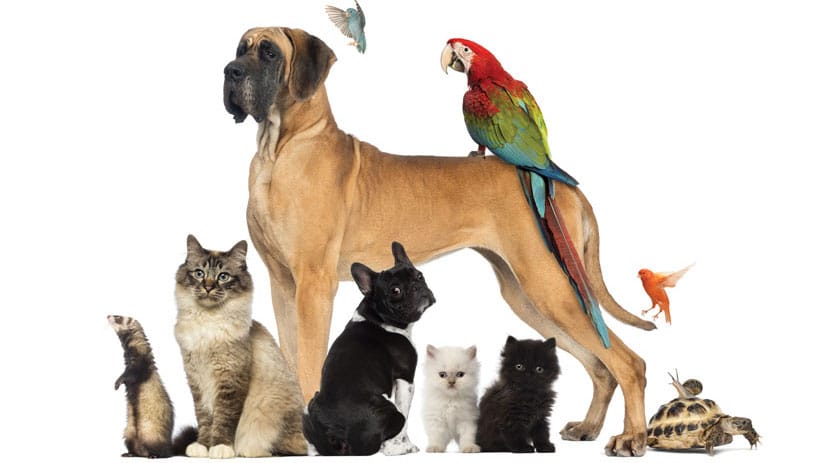A recent comment by Pope Francis in his weekly audience at St. Peter’s Square set the secular media abuzz. He was reported to have said that animals have immortal souls and will go to heaven — contrary to common, long-established theological opinion. The story, it turns out, was almost completely fabricated. The pope simply stated that the entire universe will be renewed, echoing a statement by St. Paul (cf. Rom 8:21). But the news stories still prompted a lively debate in Catholic circles and beyond, especially among pet owners: Do animals have souls? Do they go to heaven?
The animal ‘soul’
The answer to the first question depends, of course, on how we define “soul.” Ancient and medieval writers, both pagan and Christian, often used terms that we translate as “soul” (Greek psyche, Latin anima) to refer in general to that part of an animate (living) creature which sets it apart from inanimate (nonliving) creatures.
In other words, a “soul” is simply a creature’s “principle of life.”
In fact, some biblical texts in the Old Testament seem to apply certain Hebrew terms in a similar way. For example, the phrase nephesh chayah (literally, “living soul”) refers both to humans beings (Gn 2:7) and to animals (Gn 1:30).
Ruach, the Hebrew term for “spirit” (and also for “breath,” as the indicator of life), is also applied to both humans and animals in Ecclesiastes 3:21. It’s translated into English as “life breath” in the New American Bible, Revised Edition.
If we think of “soul” in this general sort of way, then, animals and even plants have what could be called a “soul” simply because they are alive. So the ancients spoke of animals as having “sensitive souls” and plants as having “vegetative souls,” though that terminology sounds strange to our modern ears.
The unique human soul
| Mosquitoes in Heaven |
|---|
|
The lower living creatures aren’t morally responsible for their behavior on earth. So even if some were to survive death by God’s special action, they couldn’t deserve either a reward or a punishment. That means we don’t have to worry about them suffering in hell. The Christian writer C.S. Lewis once heard from a reader making fun of his speculation that at least some animals might be allowed a heavenly existence. The wag demanded to know where they would put all the mosquitoes. Unperturbed, Lewis replied wryly that a heaven for mosquitoes and a hell for men might easily be combined.
|
It’s important to note that even if we use the term soul as the ancients did, we must observe (as they did) that plants, animals and humans have different kinds of souls. The plant’s “vegetative soul” (its life principle) enables it to reproduce and to assimilate nourishment for growth. That’s something a rock, for example, can’t do.
Animals can do that plus other things. Their “sensitive” souls allow them to move; to sense and respond to external stimuli; and (for some) to perform rudimentary types of learning and communication.
Even so, the human soul is unique. Of all earthly creatures, only humans are made in the image of God (cf. Gn 1:26–27) with a soul that is fully rational, able to reason and communicate at high levels, and to choose good or evil with a free will. This is true because God has given the human being an immortal spirit to serve as the animating principle (“soul”) for the body — a spirit that will never cease to exist.
No other earthly creature has an immortal spirit for a soul. Their souls are not immortal, but mortal; it’s their nature to come to an end when they die.
Among earthly creatures, then, only humans are truly able to love in the fullest sense of the word. Humans can know and love God and enter into friendship with him in a way that no other earthly creature can.
Through sanctifying grace, the human soul is capable of what we call the Beatific Vision in heaven. That is, it’s capable of entering so fully into a loving union with God that we can see him and know him as he is (cf. 1 Jn 3:2).
But lower animals don’t have, by nature, that kind of soul. Because the human soul is something much higher and greater, it’s possible for humans to have a deep friendship with God in a way that other earthly creatures cannot.
Animals in heaven?
So what about the second question: Do animals go to heaven?
Other than the Old Testament passages already noted, Scripture seems to be silent about the matter. Some may view the biblical account of Elijah’s being taken to heaven by a fiery chariot with “horses” as evidence that animals can be in heaven (cf. 2 Kgs 2:11–12). But we’re not told enough about the incident to draw any firm conclusions about the matter from that particular passage.
The Church has never pronounced on the question explicitly and definitively. But given that human beings can enjoy the beatific vision and animals cannot, Catholic theologians have commonly and reasonably concluded that life in heaven is a privilege that animals don’t share with us.
St. Thomas Aquinas, for example, taught that animal “souls” cannot by their nature survive death. Unlike human souls, they are perishable when separated from their proper bodies.
Even so, that position seems to leave open the possibility that God might choose to keep at least some animal “souls” from perishing after death, by granting them a privilege beyond their nature — what is known as a preternatural gift.
In any case, we know this much: Because animals can’t have sanctifying grace in their souls to receive the beatific vision, then if any of them do go to heaven, it wouldn’t be for the same reason that humans are in heaven.
What other reasons might there be? Perhaps it’s possible that God will allow the animals we’ve loved on earth to take part somehow in our heavenly life as part of our eternal happiness.
In fact, since God himself takes delight in all the good creatures he’s made, he might give at least some animals a life in heaven for the sake of his own pleasure.
We can only speculate; we won’t know for sure until, God-willing, we arrive in heaven ourselves.
Whatever the case may be, we can be assured that God loves every creature he makes. He loves them even more than we do.
That can be a comforting thought when we’re saddened to lose a dear pet or see some other living creature die. Because God loves them, we can entrust them to him.
Paul Thigpen is a best-selling author and award-winning journalist. His most recent book is “Manual for Spiritual Warfare” (TAN Books, $29.95).





